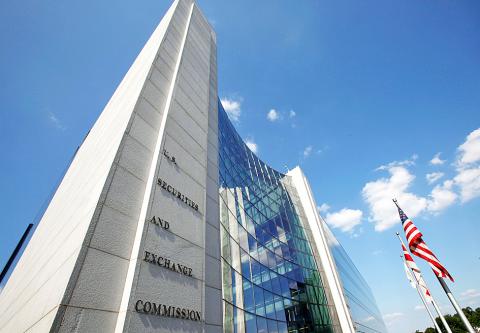The US Securities and Exchange Commission (SEC) waited until Wednesday to disclose a hack of its corporate filing system that occurred last year, raising questions about the agency’s ability to protect important financial information and comes as Americans are still weighing the consequences of the massive hack at Equifax Inc.
While the SEC discovered the breach to its corporate filing system last year, the agency said it only became aware last month that information obtained by the intruders might have been used for illegal trading profits.
Experts question the length of time taken to disclose the breach and why the SEC is not meeting the same security standards it demands of corporate America.

Photo: Reuters
“It took quite a while,” said Robert Cattanach, an attorney at Dorsey & Whitney and former trial attorney for the US Department of Justice, whose work includes cybersecurity and data breaches. “The integrity of our whole trading system is dependent on keeping this information secure... People have got some ‘splaining to do.”
The SEC did not explain why the initial hack was not revealed sooner, or which individuals or companies may have been affected. The disclosure came two months after a government watchdog said deficiencies in the corporate filing system put the system, and the information it contains, at risk.
The SEC also did not disclose any information about who might have carried out the breach. A hack by Chinese or Russian actors cannot be ruled out, experts say.
“Certainly state actors would be on the list of suspects that come to mind,” said Marcus Christian, a former federal prosecutor who is an attorney working in Mayer Brown’s cybersecurity and national security practices.
Still, the list would also include “regular old criminal actors,” Christian added.
SEC Chairman Jay Clayton disclosed the hack in a statement posted to the agency’s Web site. It came just two weeks after the credit agency Equifax revealed a stunning cyberattack that exposed highly sensitive personal information of 143 million people.
Clayton is to appear on Tuesday before the US Senate Banking Committee, and he is certain to be questioned about the hack.
US Senator and committee member Mark Warner said in a statement on Thursday that the disclosures by the SEC and Equifax show “that government and businesses need to step up their efforts to protect our most sensitive personal and commercial information.”
Clayton blamed the breach on “a software vulnerability” in the filing system known as EDGAR —Electronic Data Gathering, Analysis and Retrieval system.
EDGAR processes more than 1.7 million electronic filings a year. Those documents can cause enormous movements in the stock market, sending billions of US dollars into motion in fractions of a second.
The hack of EDGAR is especially concerning because of how widely investors have used and trusted the system, which first came online in the early 1990s.
Companies periodically file earnings and a range of financial information, and they alert investors to important developments that could affect their share prices, like government investigations, executive shake-ups and approaches for a takeover.

In Italy’s storied gold-making hubs, jewelers are reworking their designs to trim gold content as they race to blunt the effect of record prices and appeal to shoppers watching their budgets. Gold prices hit a record high on Thursday, surging near US$5,600 an ounce, more than double a year ago as geopolitical concerns and jitters over trade pushed investors toward the safe-haven asset. The rally is putting undue pressure on small artisans as they face mounting demands from customers, including international brands, to produce cheaper items, from signature pieces to wedding rings, according to interviews with four independent jewelers in Italy’s main

Japanese Prime Minister Sanae Takaichi has talked up the benefits of a weaker yen in a campaign speech, adopting a tone at odds with her finance ministry, which has refused to rule out any options to counter excessive foreign exchange volatility. Takaichi later softened her stance, saying she did not have a preference for the yen’s direction. “People say the weak yen is bad right now, but for export industries, it’s a major opportunity,” Takaichi said on Saturday at a rally for Liberal Democratic Party candidate Daishiro Yamagiwa in Kanagawa Prefecture ahead of a snap election on Sunday. “Whether it’s selling food or

CONCERNS: Tech companies investing in AI businesses that purchase their products have raised questions among investors that they are artificially propping up demand Nvidia Corp chief executive officer Jensen Huang (黃仁勳) on Saturday said that the company would be participating in OpenAI’s latest funding round, describing it as potentially “the largest investment we’ve ever made.” “We will invest a great deal of money,” Huang told reporters while visiting Taipei. “I believe in OpenAI. The work that they do is incredible. They’re one of the most consequential companies of our time.” Huang did not say exactly how much Nvidia might contribute, but described the investment as “huge.” “Let Sam announce how much he’s going to raise — it’s for him to decide,” Huang said, referring to OpenAI

The global server market is expected to grow 12.8 percent annually this year, with artificial intelligence (AI) servers projected to account for 16.5 percent, driven by continued investment in AI infrastructure by major cloud service providers (CSPs), market researcher TrendForce Corp (集邦科技) said yesterday. Global AI server shipments this year are expected to increase 28 percent year-on-year to more than 2.7 million units, driven by sustained demand from CSPs and government sovereign cloud projects, TrendForce analyst Frank Kung (龔明德) told the Taipei Times. Demand for GPU-based AI servers, including Nvidia Corp’s GB and Vera Rubin rack systems, is expected to remain high,